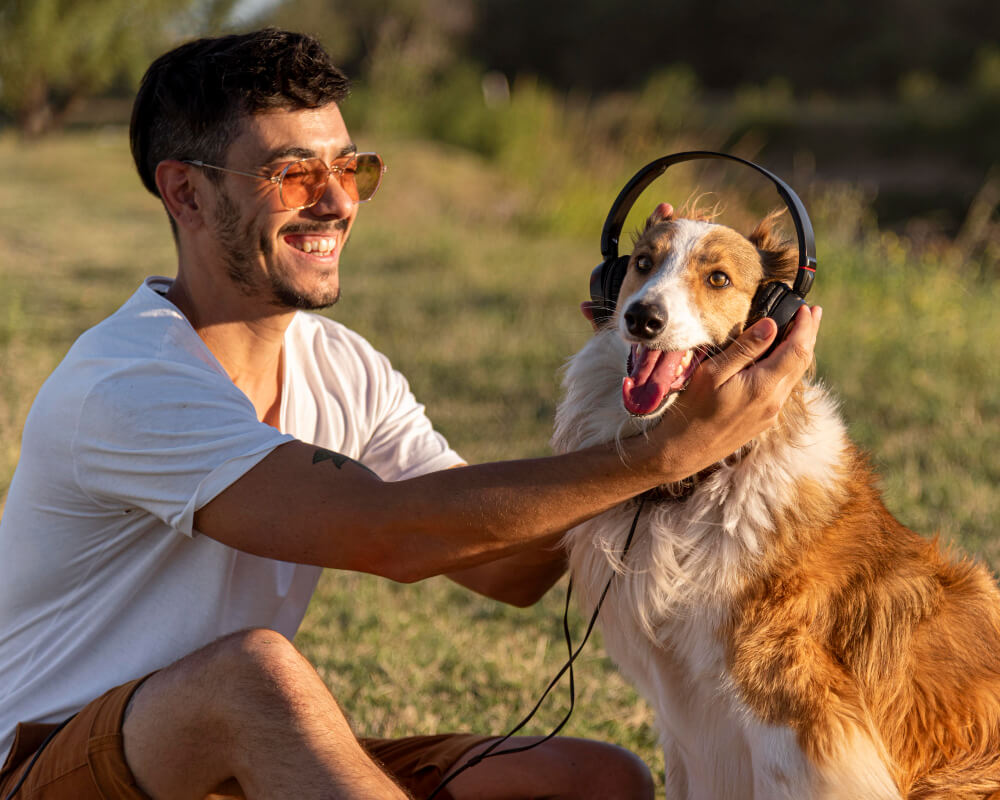Welcome to a paw-some journey towards ensuring your furry friend’s well-being! In this guide, we’ll delve into the expert insights of veterinarians, unraveling the secrets to keeping your canine companion not just healthy but also radiantly happy.
From nutrition tips to mental stimulation, join us as we explore a holistic approach to canine care, backed by the invaluable advice of veterinarians who are dedicated to the well-being of our four-legged family members.
Get ready to embark on a tail-wagging adventure of wellness with our guide, “How to Keep Your Dog Healthy and Happy: A Vet’s Advice.”
Why Your Dog’s Health and Happiness Matter
Dogs are amazing creatures that have evolved alongside humans for thousands of years. They have adapted to our lifestyles and environments, and have developed a strong bond with us. They can sense our emotions, communicate with us, and even help us in various ways. They are also intelligent, curious, and playful animals that have their own personalities and preferences.
However, dogs are not humans, and they have different needs and challenges than we do. They are susceptible to various diseases and disorders, both physical and mental, that can affect their quality of life.
They also depend on us for their well-being, and they need our attention, care, and affection. If we neglect or mistreat them, they can suffer from stress, anxiety, depression, and behavioral problems.
Therefore, it is our responsibility as dog owners to provide them with a healthy and happy life. Not only will this benefit them, but it will also benefit us. Studies have shown that dogs can improve our physical and mental health, reduce our stress levels, boost our immune system, and increase our social interactions. They can also teach us valuable lessons about loyalty, friendship, compassion, and gratitude.

The Basics of Dog Care: Nutrition, Hygiene, Exercise, and Vaccination
One of the most important aspects of dog care is providing them with a balanced and nutritious diet. Dogs need a variety of nutrients, such as protein, fat, carbohydrates, vitamins, minerals, and water, to support their growth, development, and maintenance. The amount and type of food they need depend on their age, size, breed, activity level, and health condition. Generally, puppies need more food and more frequent meals than adult dogs, and senior dogs need less food and more supplements than younger dogs.
There are many types of dog food available in the market, such as dry, wet, raw, and homemade. Each type has its advantages and disadvantages, and you should consult your vet before choosing the best option for your dog. For example, if your dog has certain health issues, your vet may recommend a best low protein dog food uk specially formulated to support their needs.
You should also avoid giving your dog human food, especially chocolate, grapes, raisins, onions, garlic, and xylitol, as they can be toxic to them. You should also provide your dog with fresh and clean water at all times, and change it regularly.
Another essential aspect of dog care is maintaining their hygiene. Dogs need regular grooming, bathing, brushing, and trimming to keep their coat, skin, nails, ears, and teeth clean and healthy. Grooming can also help you detect any signs of infection, injury, or parasites, such as fleas, ticks, and worms, and treat them accordingly. You should also check your dog’s eyes, nose, and mouth for any discharge, inflammation, or odor, and consult your vet if you notice anything unusual.
Dogs also need regular exercise to keep them fit, strong, and agile. Exercise can also help them burn off excess energy, prevent boredom, stimulate their mind, and improve their mood. The amount and type of exercise your dog needs depend on their age, size, breed, and personality.
Generally, larger and more active breeds need more exercise than smaller and more sedentary breeds, and young and healthy dogs need more exercise than old and sick dogs. You should also consider the weather, the terrain, and the time of day when exercising your dog, and avoid overexerting them or exposing them to extreme temperatures.
Finally, dogs need regular vaccination to protect them from various diseases, such as rabies, distemper, parvovirus, hepatitis, leptospirosis, and bordetella. Vaccination can also prevent the spread of these diseases to other animals and humans.
The schedule and frequency of vaccination depend on your dog’s age, health, and lifestyle, and you should follow your vet’s recommendations. You should also keep a record of your dog’s vaccination history, and update it whenever necessary.
Common Health Problems in Dogs and How to Prevent Them
Despite our best efforts, dogs can still get sick or injured from time to time. Some of the most common health problems in dogs are:
- Allergies: Allergies are an abnormal immune response to a substance that is harmless to most animals. Dogs can be allergic to various things, such as food, pollen, dust, mold, fleas, and medications.
The symptoms of allergies can include itching, scratching, licking, biting, sneezing, coughing, wheezing, runny nose, watery eyes, and skin rashes. To prevent allergies, you should identify the allergen and avoid or eliminate it from your dog’s environment.
You should also consult your vet for the best treatment options, such as antihistamines, steroids, or immunotherapy.
- Arthritis: Arthritis is a degenerative joint disease that causes inflammation, pain, stiffness, and reduced mobility in the joints. It is more common in older, overweight, and large breed dogs, but it can also affect younger and smaller dogs. The symptoms of arthritis can include limping, difficulty walking, climbing, jumping, or lying down, reluctance to play or exercise, and behavioral changes.
To prevent arthritis, you should keep your dog at a healthy weight, provide them with a balanced diet, and give them moderate exercise. You should also consult your vet for the best treatment options, such as painkillers, anti-inflammatories, or supplements.
- Cancer: Cancer is an abnormal growth of cells that can invade and destroy the surrounding tissues and organs. It can affect any part of the body, and it can be benign or malignant.
The symptoms of cancer can vary depending on the type, location, and stage of the disease, but they can include lumps, bumps, swellings, sores, wounds, bleeding, weight loss, loss of appetite, vomiting, diarrhea, difficulty breathing, urinating, or defecating, and lethargy.
To prevent cancer, you should spay or neuter your dog, avoid exposing them to carcinogens, such as tobacco smoke, pesticides, or radiation, and monitor them for any signs of illness. You should also consult your vet for the best treatment options, such as surgery, chemotherapy, or radiation.
- Diabetes: Diabetes is a metabolic disorder that affects the ability of the body to produce or use insulin, a hormone that regulates the blood sugar level. It can be caused by genetic, environmental, or hormonal factors, and it can lead to serious complications, such as blindness, kidney failure, nerve damage, and infections.
The symptoms of diabetes can include increased thirst, hunger, urination, and weight loss, decreased energy, and poor coat quality. To prevent diabetes, you should keep your dog at a healthy weight, provide them with a balanced diet, and give them regular exercise.
You should also consult your vet for the best treatment options, such as insulin injections, oral medications, or dietary changes.
- Obesity: Obesity is a condition that occurs when the body stores excess fat, resulting in increased weight and body mass index. It can be caused by overfeeding, lack of exercise, or underlying medical conditions, and it can increase the risk of various diseases, such as arthritis, diabetes, heart disease, and cancer.
The symptoms of obesity can include difficulty breathing, walking, running, or jumping, reduced stamina, heat intolerance, and skin problems. To prevent obesity, you should measure and control your dog’s food intake, provide them with a balanced diet, and give them regular exercise.
You should also consult your vet for the best weight loss plan, and monitor your dog’s progress.

How to Recognize and Treat Dog Anxiety and Depression
Dogs are not only prone to physical health problems, but also to mental health problems, such as anxiety and depression. Anxiety is a state of fear, nervousness, or worry that is triggered by a specific situation, object, or person.
Depression is a state of sadness, hopelessness, or apathy that persists for a long time and affects the normal functioning of the dog.
Both anxiety and depression can affect any dog, regardless of their age, breed, or background, and they can have various causes, such as trauma, abuse, neglect, separation, loss, illness, injury, or stress.
The symptoms of anxiety and depression can include:
- Changes in appetite, weight, or eating habits
- Changes in sleep patterns or energy levels
- Changes in mood or behavior, such as aggression, withdrawal, or clinginess
- Changes in vocalization, such as barking, whining, or howling
- Changes in body language, such as trembling, panting, drooling, or pacing
- Changes in activity, such as restlessness, hyperactivity, or lethargy
- Changes in habits, such as chewing, digging, scratching, or licking
- Changes in elimination, such as accidents, marking, or constipation
To treat anxiety and depression, you should first identify and address the root cause of the problem, and provide your dog with a safe, comfortable, and stimulating environment. You should also give your dog plenty of attention, affection, and praise, and engage them in positive and fun activities, such as playing, training, or socializing. You should also consult your vet for the best treatment options, such as medication, supplements, or therapy.
Tips and Tricks to Make Your Dog Happy and Engaged
Besides taking care of your dog’s health, you should also make sure that your dog is happy and engaged. Happiness and engagement are essential for your dog’s mental and emotional well-being, and they can also enhance your bond with your dog. Here are some tips and tricks to make your dog happy and engaged:
- Provide your dog with a variety of toys, such as balls, ropes, squeaky toys, or puzzle toys, and rotate them regularly to keep them interested. You can also hide treats or kibble inside the toys to make them more challenging and rewarding.
- Play with your dog every day, and try different games, such as fetch, tug-of-war, hide-and-seek, or chase. You can also teach your dog new tricks, such as sit, stay, roll over, or shake, and reward them with praise, treats, or toys.
- Take your dog for walks every day, and explore different routes, parks, or trails. You can also let your dog sniff, explore, and interact with other dogs and people, as long as they are friendly and well-behaved. You can also take your dog for car rides, bike rides, or hikes, as long as they are comfortable and safe.
- Enroll your dog in a doggy daycare, a dog park, or a dog club, where they can socialize, play, and learn with other dogs and humans. You can also hire a dog walker, a dog sitter, or a dog trainer, if you are busy or away from home.
- Celebrate your dog’s birthday, adoption day, or any special occasion, and treat them with a cake, a gift, or a party. You can also dress them up, take photos, or make videos, and share them with your friends and family.
- Show your dog that you love them, and express your gratitude, appreciation, and admiration for them. You can also cuddle, pet, massage, or groom them, and tell them how much they mean to you. You can also sing, dance, or laugh with them, and make them feel happy and relaxed.
Well, That’s a Wrap
As we wrap up our journey into the realm of canine well-being, remember that a healthy and happy dog is more than just a delightful companion—it’s a reflection of responsible pet ownership. By incorporating the wisdom shared by veterinarians in this guide, you’re not only ensuring the physical health of your furry friend but also nurturing a bond that transcends the ordinary.
From tail-wagging exercises to nourishing meals, each act of care contributes to a life filled with joy for your canine companion. Here’s to a future filled with endless fetch sessions, ear scratches, and the boundless love only a happy and healthy dog can provide.
Cheers to your dog’s well-deserved life of vitality and happiness!
